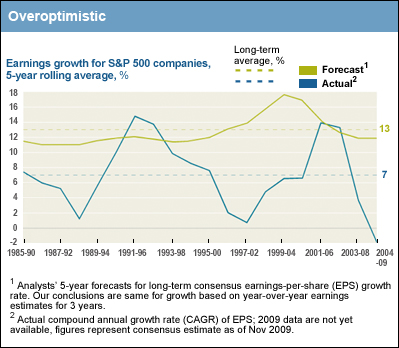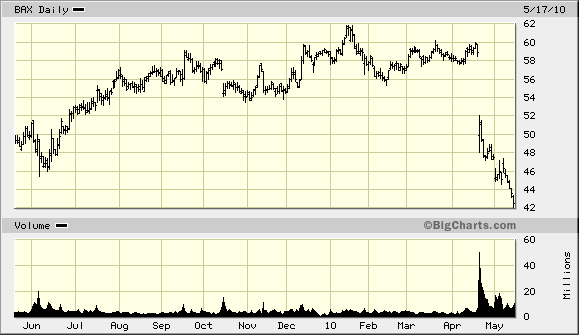Archive for May, 2010
-
Please Join Us for Today’s Strategy Session
Eddy Elfenbein, May 18th, 2010 at 10:17 am
Charles Kirk, who runs the invaluable Kirk Report, has graciously invited me to participate in today’s online Strategy Session.
Beginning at noon, Charles and I will have an online stock chat for about 20 minutes or so. Then we’ll open up the forum to take questions from you. You can access today’s Strategy Session at this site.
The action starts at noon ET. Hope to see you there! -
Home Depot Beats By Five Cents a Share
Eddy Elfenbein, May 18th, 2010 at 9:12 amToday it was Home Depot’s (HD) turn to report earnings and the company did very well:
Home Depot reported a profit of $725 million, or 43 cents a share for the May 2nd-ended quarter, up from $514 million, or 30 cents, a year earlier. Excluding items, earnings rose to 45 cents from 35 cents.
Revenue jumped 4.3% to $16.86 billion, or 5.7% excluding the impact of Expo stores, which Home Depot shut down last year, from the year-earlier results. Same-store sales rose 4.8%, the second consecutive quarterly increase after 14 quarters of declines.
Analysts polled by Thomson Reuters had most recently forecast earnings of 40 cents on $16.37 billion in revenue.That’s an impressive earnings beat. Compared with Lowe’s (LOW), Home Depot has been able to hold the line on margins. The big number in retail is same-store sales. At Lowe’s, same-store sales rose by 2.4% while they were up 3.3% at Home Depot.
Home Depot also raised its full-year EPS guidance to $1.88. The stock is a bit pricey here. I think the market expects to see more big earnings surprises this year. -
Buffett Rebalances His Portfolio
Eddy Elfenbein, May 18th, 2010 at 8:58 amFrom Bloomberg:
Berkshire eliminated its stake in health insurers WellPoint Inc. and UnitedHealth Group Inc., lender SunTrust Banks Inc. and property-casualty carrier Travelers Cos., the Omaha, Nebraska- based company said yesterday in a regulatory filing disclosing U.S. equity investments at the end of the first quarter. Buffett’s firm reduced holdings in Kraft Foods Inc., Johnson & Johnson and Procter & Gamble Co.
Buffett, 79, has tapped Berkshire’s U.S. equity portfolio to fund the $27 billion acquisition of railroad Burlington Northern Santa Fe and arrange investments in securities that don’t trade on public exchanges. He invested abroad in the first quarter, making Berkshire the biggest shareholder of German reinsurer Munich Re, and told investors this month to expect “modest” returns from stocks. -
The Bears Are Growling
Eddy Elfenbein, May 17th, 2010 at 5:42 pm
CNBC has a poll up asking if the Dow will reach 5,000 this year (by the way, it’s mid-May). An amazing 40% said it will.
This is obviously highly unscientific, but sometimes I wonder…are there that many extreme bears out there? -
Overly Bullish Analysts
Eddy Elfenbein, May 17th, 2010 at 4:41 pmFrom the Harvard Business Review:
For the past quarter century, equity analysts’ earnings-growth estimates have been almost 100% too high. Their overoptimistic projections have generally ranged from 10% to 12% annually, compared with actual growth of 6% (excluding the spike in growth from 1998–2001), according to McKinsey research. Only in strong-growth years such as 2003 to 2006 did forecasts hit the mark.

-
Time to Legalize Insider Trading?
Eddy Elfenbein, May 17th, 2010 at 3:15 pmMatthew Yglesias get his Adam Smith on and questions why insider trading is illegal.
After all, one important function of financial markets is supposed to aggregate information so as to price assets correctly and thus guide the allocation of investment. Excluding informed participants from trading subverts the main goal of financial markets’ existence.
Let me back up a second and explain that insider trading is perfectly legal. All that corporate insiders need to do is declare what trades they make with their own stock, how much and when.
What’s illegal is when corporate insiders trade on “non-public” info. Let’s say the CEO knows that the earnings report is going to be terrible, so she dumps her shares ahead of time.
It’s actually a very murky subject. Even the movie Wall Street gets insider trading wrong. Hard as it may be to believe, Bud Fox didn’t do anything illegal (well…except for theft when he was dressed as a janitor). But the dirt he gave to Gekko wouldn’t be a legal issue because all that information was publicly observable. That’s the key. It comes down to what the public can see and what it can’t. The problem with enforcement is that it makes the government label information.
The libertarian argument is that information is information, and it’s a waste of time trying to label what’s known and unknown. Plus, you get Yglesias’ view that it really doesn’t matter since insider trading goes on anyway. (By the way, has anyone mentioned that the SEC’s case against Goldman Sachs was leaked to the New York Times? This is a scandal twice over—once for the deed and again because no one cares.)
Insider trading reminds of arguments in favor of legalizing black mail. I see their point but, darn it, it just seems…wrong. I would still prefer the companies I own prohibit their executives from trading on non-public information. This, of course, is a non-government solution although it exposes execs to civil lawsuits. The goal should be to make all the non-public information public. -
Math Problems at the WSJ
Eddy Elfenbein, May 17th, 2010 at 12:05 pmFrom an editorial today:
Taxpayer groups rightly object that the tax hike comes with no spending restraints. Arizona got into this crisis because during the boom years—2003 to 2007—then-Governor Janet Napolitano, a Democrat, and Republicans in the legislature let spending climb by more than 100% to $10 billion from $6.6 billion.
An increase from $6.6 billion to $10 billion is an increase of 51.5% which is just under 11% annualized over four years.
-
Can Things Get Worse for Baxter?
Eddy Elfenbein, May 17th, 2010 at 10:23 amI like to be upfront about my investing mistakes. Without a doubt, the biggest dud on this year’s Buy List is Baxter International (BAX). Just when I think things can’t get any worse for them, they do:
Biopharmaceutical company Halozyme Therapeutics Inc said it was voluntarily recalling certain lots of its fluid absorption drug, Hylenex, after Baxter International Inc confirmed the presence of small flake-like glass particles in the drug.
On Sunday, Halozyme reported that its development partner Baxter has had “manufacturing failures” in making Hylenex.Baxter is now down -27% on the year for us. The stock is at a new 52-week low and it’s going for about 10 times next year’s earnings.

-
Lowe’s Lifts Guidance But Not Enough for Wall Street
Eddy Elfenbein, May 17th, 2010 at 10:12 amI recently said that Lowe’s (LOW) and Home Depot (HD) were nearly tied as investments but I gave a slight edge to Home Depot. Lowe’s reported first-quarter earnings this morning and while the results were good and the company raised guidance, it wasn’t as much as the Street hoped for:
The company, based in Mooresville, N.C., said it earned $489 million, or 34 cents a share, in the three-month period ended April 30. In the same period last year the Mooresville, N.C., company earned $476 million, or 32 cents a share.
Revenue rose 4.7 percent to $12.39 billion.
The results handily beat the expectations of analysts. According to Thomson Reuters, analysts expected the company to earn 31 cents a share on revenue of $12.24 billion.
(…)
For the second quarter and full year, Lowe’s said it expects revenue to rise between 5 percent and 7 percent over the prior year and revenue at stores open at least a year to grow between 2 percent and 4 percent. Previously for the year, the company expected sales to rise between 4 percent and 6 percent, and revenue at stores open at least a year to increase 1 percent to 3 percent.
The company expects second-quarter earnings per share to range from 57 cents to 59 cents, shy of the 62 cents a share analysts expect.
For the full year, Lowe’s now expects earnings per share to range from $1.37 to $1.47. Previously it had expected a range of $1.30 to $1.42. Analysts expect earnings per share of $1.45 for the year on revenue of $49.67 billion, according to Thomson.The stock is now down to $24.71 as I write this which works out to 17.4 times this year’s earnings. That seems like a fair price. Lowe’s is neither a screaming bargain nor overpriced. Home Depot reports tomorrow.
-
Exchange Scene in Trading Places
Eddy Elfenbein, May 13th, 2010 at 3:00 pm
Explanation: The Duke brothers have a false crop report claiming a poor orange harvest. Their trader buys orange juice heavily at the open in an attempt to corner the market before the crop report is announced. At 2:38 Dan Aykroyd and Eddie Murphy start shorting orange juice and all the traders are happy to sell to them. Then the real crop report is announced and it reveals that the orange harvest will be fine. The selling continues. Finally, at 5:18, Aykroyd and Murphy start covering their short by buying. So instead of buying then selling, they sold first and bought later — and kept the difference.
-
-
Archives
- April 2025
- March 2025
- February 2025
- January 2025
- December 2024
- November 2024
- October 2024
- September 2024
- August 2024
- July 2024
- June 2024
- May 2024
- April 2024
- March 2024
- February 2024
- January 2024
- December 2023
- November 2023
- October 2023
- September 2023
- August 2023
- July 2023
- June 2023
- May 2023
- April 2023
- March 2023
- February 2023
- January 2023
- December 2022
- November 2022
- October 2022
- September 2022
- August 2022
- July 2022
- June 2022
- May 2022
- April 2022
- March 2022
- February 2022
- January 2022
- December 2021
- November 2021
- October 2021
- September 2021
- August 2021
- July 2021
- June 2021
- May 2021
- April 2021
- March 2021
- February 2021
- January 2021
- December 2020
- November 2020
- October 2020
- September 2020
- August 2020
- July 2020
- June 2020
- May 2020
- April 2020
- March 2020
- February 2020
- January 2020
- December 2019
- November 2019
- October 2019
- September 2019
- August 2019
- July 2019
- June 2019
- May 2019
- April 2019
- March 2019
- February 2019
- January 2019
- December 2018
- November 2018
- October 2018
- September 2018
- August 2018
- July 2018
- June 2018
- May 2018
- April 2018
- March 2018
- February 2018
- January 2018
- December 2017
- November 2017
- October 2017
- September 2017
- August 2017
- July 2017
- June 2017
- May 2017
- April 2017
- March 2017
- February 2017
- January 2017
- December 2016
- November 2016
- October 2016
- September 2016
- August 2016
- July 2016
- June 2016
- May 2016
- April 2016
- March 2016
- February 2016
- January 2016
- December 2015
- November 2015
- October 2015
- September 2015
- August 2015
- July 2015
- June 2015
- May 2015
- April 2015
- March 2015
- February 2015
- January 2015
- December 2014
- November 2014
- October 2014
- September 2014
- August 2014
- July 2014
- June 2014
- May 2014
- April 2014
- March 2014
- February 2014
- January 2014
- December 2013
- November 2013
- October 2013
- September 2013
- August 2013
- July 2013
- June 2013
- May 2013
- April 2013
- March 2013
- February 2013
- January 2013
- December 2012
- November 2012
- October 2012
- September 2012
- August 2012
- July 2012
- June 2012
- May 2012
- April 2012
- March 2012
- February 2012
- January 2012
- December 2011
- November 2011
- October 2011
- September 2011
- August 2011
- July 2011
- June 2011
- May 2011
- April 2011
- March 2011
- February 2011
- January 2011
- December 2010
- November 2010
- October 2010
- September 2010
- August 2010
- July 2010
- June 2010
- May 2010
- April 2010
- March 2010
- February 2010
- January 2010
- December 2009
- November 2009
- October 2009
- September 2009
- August 2009
- July 2009
- June 2009
- May 2009
- April 2009
- March 2009
- February 2009
- January 2009
- December 2008
- November 2008
- October 2008
- September 2008
- August 2008
- July 2008
- June 2008
- May 2008
- April 2008
- March 2008
- February 2008
- January 2008
- December 2007
- November 2007
- October 2007
- September 2007
- August 2007
- July 2007
- June 2007
- May 2007
- April 2007
- March 2007
- February 2007
- January 2007
- December 2006
- November 2006
- October 2006
- September 2006
- August 2006
- July 2006
- June 2006
- May 2006
- April 2006
- March 2006
- February 2006
- January 2006
- December 2005
- November 2005
- October 2005
- September 2005
- August 2005
- July 2005
 Eddy Elfenbein is a Washington, DC-based speaker, portfolio manager and editor of the blog Crossing Wall Street. His
Eddy Elfenbein is a Washington, DC-based speaker, portfolio manager and editor of the blog Crossing Wall Street. His